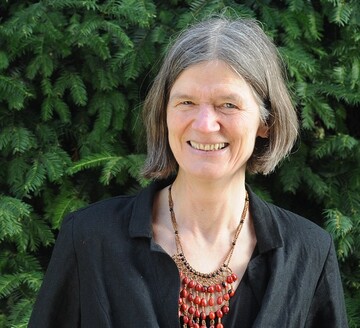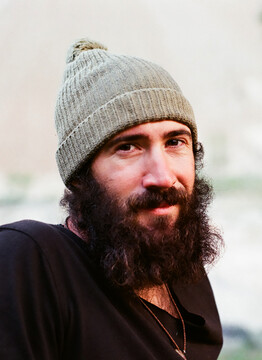Personal stories
We asked around and talked to some people who have decided to fly less. For them, the alternatives they have found are not a sacrifice, but a gain. And they show us how we can change our perspective on flying.

Niko Paech, professor, growth critic
When did you last take a flight?
I took my one and only flight in 1993.
Why don’t you fly anymore?
Because, firstly, this is the maximum environmental damage that can legally be caused by a person with a certain amount of money. And secondly, because it does not meet basic needs; instead, it satisfies the demand for decadent luxury.
How did you arrive at this decision?
Early on in life, I internalized that Kant quote “Have the courage to use your own understanding”; it never occurred to me to start flying at all.
What do you see as alternatives to business air travel?
I deny that we have a right or a need to find alternatives for ruinous action. There is no alternative to reducing or avoiding world travel. And within Europe, the rail operators and networks provide satisfactory services.
What effect does your decision have on holidays that you take?
I wouldn’t think of flying on holiday - where would I get the right to do that? Train, bus, bike, hiking shoes and very rarely a ferry are enough.
How do you reach distant places now?
I adjust my travel radius to what can be reached in an environmentally responsible way.
What is the most difficult thing for you about not flying?
Nothing is less difficult than completely freeing your life of a certain option.
Do you make any exceptions? Is there a flight that you would not forego?
No. I also don’t make exceptions when it comes to respecting human rights.
How do the people around you react to the fact that you do not fly?
Some of the eco-vandals I meet admit that they feel uncomfortable and come up with excuses or constraints. Some play dumb. Others claim to want to follow my example. Still others fortify me because they live the same way.
How do you react when friends tell you about their long-distance/air travel?
I take it in my stride.
What tips do you have for other people who want to fly less?
They should find out about their individual carbon footprint.
Is it an alternative for you to fly and offset the emissions?
No, I’m Catholic and I’m glad that my religion overcame the sale of indulgences long ago. It’s a pity that the academic middle class is not yet as far advanced.
What is the nicest experience you would not have had if you did not forgo flying?
I find this question very strange. “Forgo”? How can someone renounce something that he or she was never entitled to?
What else can an individual do to reduce the climate impact of air travel and where do you think the state needs to intervene?
What is needed is a movement of non-flyers who appear in the media and in public to confront other members of society. Policymakers jump on bandwagons, at least as long as democratic rules apply, and will only react when the demand for air travel in civil society falls. Then they could close airports and allow air travel only within the bounds of an individual carbon account.
Britta Steffen, swimmer, businesswoman

Why don’t you fly anymore?
It’s for socio-economic reasons.
How did you arrive at this decision?
My own lifestyle led me to make this decision. At the beginning of 2019, I didn’t want to fly unnecessarily anymore for projects, charity work, honours or professionally. It just didn’t feel good to be on the road and to leave my one-year old child at home. Greta also inspired me and when I started reading up on climate change and so on after maternity leave during which I lived in a kind of bubble, it was clear that there would not be an intact world left for my son in the long run if I/we didn’t start changing my/our behaviour, so I did.
How does your decision affect your work and any necessary business trips?
I cannot take on all requests/projects that come my way because of this decision. For me, it separates the things I can do from the things I can’t because they are no longer tenable based on my personal stance.
What are the alternatives to business air travel for you?
There are few alternatives – but Skype and/or conference calls with clients/partners/colleagues who are on site for a project, so that one doesn’t have to always commute.
How does your decision affect the holidays you take?
My family was surprised at first, but they also find it correct and resolute. Holidays are possible without flying.
How do you reach faraway places now?
I either don’t or I travel by train. So I won’t be seeing Australia, New Zealand or America again for the time being.
Do you sometimes make exceptions, or what flight would you not forego?
I’m not planning to make any exceptions.
How do people around you react to the fact that you no longer want to fly?
I think that some people find this decision excessive, but it might make one or two people re-think their own travel behaviour – I don’t expect anything else.
How do you react when friends tell you about their long-distance/air travel?
They’re adults. I like to offer my opinion, but everyone has a head to think for themselves. Lecturing others does not go well, in my opinion.
What tips do you have for other people who want to fly less?
I don’t give any tips. I believe that everyone has to decide for themselves whether or not to change something in their lives. I just hope that such a decision like mine will inspire people to take a closer look at their own carbon footprint.
Is it an alternative for you to fly and offset the emissions?
No, because it would still harm the climate and we only have one planet; it is not interested in our money - on the contrary: in many cases monetary interests destroy it.
What is the nicest experience you would not have had if you did not forgo flying?
That’s a difficult question! Probably that when I hear I have to fly somewhere for something, I don’t even have to think about whether I’m going to do it and how I’m going to arrange it all with a small child, so I avoid that stress and can spend more time with my family.
What else can an individual do to reduce the climate impact of air travel and where do you think the state needs to intervene?
You can ask yourself whether you are heating sensibly, whether you actually need a car when there is good public transport, whether you really need to fly several times a year, whether you can reduce your consumption and use of animal products, and much more. Otherwise, as a person living in Germany, you’re already generating 5 tons of CO₂ (so I’ve read) by using streetlights, traffic lights, public buildings, etc. - Only the state can change those things.

Veit Bürger, researcher, energy expert
When did you last take a flight? Why do you no longer fly?
My family and I have not flown for private purposes for more than ten years. My wife had suggested that we stop flying for climate protection reasons. The reasons are obvious: flying is by far the most climate-damaging way to get to your holiday destination. Many people ruin their personal carbon footprint by flying. The CO₂ savings made by purchasing green electricity, eating regional produce or having your own photovoltaic tiles on the roof are not proportional to the emissions caused by a flight to, for example, Southeast Asia.
Professionally, I have flown twice in the last ten years. The last time was about two years ago. I was in China for a week to take part in a conference on renewable heat and other events organized by the German Society for International Cooperation (GIZ). I thought long and hard about whether I should go at all. Prominent representatives from various Chinese ministries attended the meetings, so I hope my participation made a positive contribution to climate protection and facilitated an exchange of knowledge.
What effect does your decision have on your work and any business trips you may have to take?
I take the train for business trips within Europe. I often take the night train and sometimes also the ferry. Journeys to Athens, Vilnius, Warsaw or Edinburgh have become exciting experiences as a result. Since it is easy for me to work on the train, I don’t lose any working time through journey times, which are sometimes much longer than travelling by plane. When I’m invited to conferences outside Europe, I usually turn down the invitations.
What effect does your decision have on holidays that you take?
Every summer we go on holiday to the same small Greek island. The outward and return journeys take three days in each direction. On the outward journey we travel by train, night train, ferry, taxi and bus. When our children were smaller, that journey was of course rather strenuous. Nowadays, we all enjoy the long journey. I look forward to the first cappuccino on the train station forecourt in Venice with a view of the canals and the night spent at the foot of the Acropolis in Athens. We also read lots of books. The nice thing is that the holiday begins when the ICE train pulls out of the Freiburg station.
How do you reach faraway places now?
By using so-called “grounded” modes of transport. But you have to remember: the farther and more exotic the destination, the more demanding the planning of the trip. Fortunately, we have a travel agency in Freiburg that specializes in rail travel. And my wife has become a real expert when it comes to arranging complex journeys with multiple connections.
What is the most difficult thing for you about not flying?
That there are countries, landscapes and cultures that we can no longer visit and experience.
Do you make any exceptions? Is there a flight you would not forgo?
I’d make an exception if, as a result of the flight, e.g. by participating in a specific project, I can make a greater contribution to climate protection than I cause damage to the climate by flying.
How do the people around you react to the fact that you no longer want to fly?
That’s a difficult point. It’s great when I notice that colleagues, friends and acquaintances are also starting to address the issue and changing their travel behaviour. It is always difficult when friends and colleagues talk enthusiastically about their long-distance travel. This is despite the fact that a lot of them are aware of the climate impact of air travel. Or when people say things like “We have such a stressful life, travelling by rail is not for us.”
What tips do you have for other people who want to fly less?
Simply try out the alternatives! For many people in Germany, for example, London feels far from home; there’s even a channel in between. Ergo, you tend to think you’d have to fly to get there. But from our home in Freiburg, it now takes seven hours by train to get to the British capital. And you arrive in the middle of the city, not at some airport on the outskirts. Once you’ve travelled to London by train, you wonder why you actually thought you’d have to fly there.
Is it an alternative for you to fly and offset the emissions?
No. Avoiding flying is the top priority. You should only fly and offset the emissions if a flight is really unavoidable.
What else can an individual do to reduce the climate impact of air travel and where do you think the state needs to intervene?
Everyone should have a feeling for what their individual carbon footprint looks like, what its components are and what influence long-haul flights in particular have on it. To take an example: Every citizen in Germany produces around 10 tons of CO₂ per year. If you take a flight to Bangkok, it increases the footprint by over 6 tons. Those are the proportions we’re dealing with. Unfortunately, flying is often the cheapest way to travel. But that’s not surprising, since passengers fly between airports that are often publicly subsidized and in aeroplanes that use fuel not subject to taxes. So first and foremost, policymakers must ensure that we have more price fairness between the different modes of transport.
Josephine Löwenstein, limnologist, yoga teacher

When did you last take a flight?
In around 2013; before that in around 2000.
Why do you not fly anymore?
I don’t want to be responsible for any more harmful CO₂ emissions than necessary, and I also want to be consistent with others in my environmental commitment.
How did you arrive at this decision?
I’ve been interested in environmental and climate protection since the 1980s; since then, I have only ever flown as a rare exception.
What effect does your decision have on your work and any business trips you may have to take?
Professionally, I don’t have to travel far; for my yoga training (for my part-time job) I was sorely tempted to fly to India, but then decided to choose a course that is only a train journey away.
What effect does your decision have on holidays that you take?
I am very happy and satisfied with the decision. However, it is often not easy living in a partnership when an individual has taken this decision. My husband flies relatively often to faraway countries for business and is disappointed that I don’t want to accompany him once in a while. As a whole family, we once cancelled attending the wedding of close relatives in Mallorca. I also did not allow my son to take part in a school trip once (which involved a flight to Barcelona) and looked for a nice alternative for him since he could not go.
How do you reach faraway places now?
What I can’t reach by train, I don’t need to reach: there are documentaries about all parts of the world; in my neighbourhood, I can learn a lot about Afghan culture and learn Farsi if I want to.
What is the most difficult thing for you about not flying?
Not being able to visit my children who spent years abroad, one in Mexico and the other in Ecuador; not being able to see such an important part of their lives, not being able to get to know the host families and places – that was really hard for me; also disappointing my husband is difficult; and a good friend lives in Brazil who keeps on inviting us to visit.
Do you make any exceptions? Is there a flight that you would not forgo?
The flight I took in 2013 was an exception; I visited a son who was studying in Spain.
How do the people around you react to the fact that you no longer want to fly?
They often react with incomprehension (“You can make ONE exception!”).
What tips do you have for other people who want to fly less?
There are sooo many beautiful places that you can visit without getting on a plane. If flying is no longer an option for you, you don’t even come upon ideas like “oh, I would like to see Nepal…”. It’s like with a car: if you don’t have one (like me), you don’t even think about doing things that are only possible with a car.
Is it an alternative for you to fly and offset the emissions?
Yes, when my husband has to make necessary business trips.
What else can an individual do to reduce the climate impact of air travel and where do you think the state needs to intervene?
There MUST be more government rules on air travel; individuals are too weak and succumb to temptation. There should be:
-
a tax on kerosene at last
-
a significant increase of the CO₂ price
-
a ban on advertising flying (as for smoking)?
-
publicize good alternatives for holidays that can be taken in your country of residence (e.g. tourism programs for Mecklenburg and Brandenburg, etc.)
-
sustainable tourism has to be made cool (like organic food)
-
a ban on school trips made by plane
-
companies must be given incentive programs to make their business trips by train
-
expand rail networks
-
maintaining changes after the pandemic, e.g. video conferences instead of travelling.

Patrick Allgaier, world traveller, filmmaker
When did you last take a flight?
In January 2013; it was a business trip between Frankfurt and Madrid.
Why do you no longer fly?
Between 2013 and 2016 I travelled around the world without flying with my girlfriend Gwendolin Weisser. Our three-and-a-half-year circumnavigation of the globe showed us how much the journey can become the destination when you travel only by land and water. We didn’t miss out on anything by not flying; instead, we were able to consciously perceive the changes in climate, culture, food, vegetation, clothing, faces… In the first big stage of our journey, we travelled from Germany to India over 10 months. When we arrived in India, we didn’t experience a culture shock, because we did not suddenly land there, but came closer to the country bit by bit in the months prior. Today we know differences between Germany and India not because we got to know both countries, but because we know what lies in between.
How did you arrive at this decision?
When we left home in spring 2013, we started with the romantic idea of wanting to circumnavigate the world “terran,” i.e. without a plane. The further we got, the more we realized how decelerated and consciously aware we were on our journey. Not flying was not so much a climate-conscious decision during our world trip. That came only after our return, when we realized how urgently the climate crisis must be addressed and what a big climate impact flying has.
What effect does your decision have on your work and any business trips you may have to take?
When a film festival in Moscow showed our film “WEIT.” in 2018, we were invited to give a director’s talk. We told the organizers we’d only come in person if we could get there without flying. Instead of booking a flight as usual, the travel costs for a train ride (Freiburg - Moscow - Freiburg) were approved. Unfortunately, a few days before the start of the trip I was in bed with pneumonia and we couldn’t catch the train. We were also invited to film festivals in Taiwan, China and Argentina. We didn’t accept those invitations, however, because we didn’t want to travel by plane and the overland journey would have taken too long (we’d briefly considered doing that).
What effect does your decision have on holidays that you take? How do you reach faraway places now?
For shorter trips, we don’t stray very far from home. For example, we often travel as a family by cargo bike to the Black Forest or to the Vosges Mountains in France. The time we have available determines the radius of our travel. In 2019, we travelled to Morocco for 3 months as a family: we went there and back over land and took a caravan on the ferry (from Italy to Morocco). Once again, the journey is the destination; being on the road is an adventure for us.
What is the most difficult thing for you about not flying?
Preparing and researching the trip is more elaborate. We would like to travel within Europe to Georgia again soon. By plane that’s very easy and uncomplicated. By train you have to collect a lot of data and connections, look for special travel agencies and spend more money if necessary. It would be helpful if there were more information and services available that make this easier, e.g. “terran” travel agencies that by their nature don’t use airline operators.
Do you make any exceptions? Is there a flight that you would not forgo?
Our son was born in Mexico. We would love to travel to his birthplace as a family in the next few years. With three children, the flight-free journey to Central America is rather complicated. We would not dare to sail with small children; container ships are very expensive and only take children on board that are at least 3 years old. So it’s still open at the moment whether we’ll fly to Mexico. My inclination, I think, is to forgo the trip and travel instead within Europe without flying.
How do the people around you react to the fact that you no longer want to fly?
Mostly they’re very positive and interested. Some start to question their own flying behavior and express the desire to fly less in the future or say that they haven’t flown for a long time. Sometimes I encounter people who defend flying and say “I simply have to fly because there is no other way”. But most of all, I notice in conversations about flying behavior how much the climate impact of airplanes continues to be underestimated.
What tips do you have for other people who want to fly less?
Take a look at <www.terran.eco>!
Ask yourself why you (think you) need to travel. Recreation and adventure can be had without getting on a plane. With the many grounded, so-called “terran” alternatives, it takes time and a little courage to try something new. Travelling sustainably now is the basis for being able to travel at all in the future.
Is it an alternative for you to fly and offset the emissions?
Offsetting must not distract from the real questions: Do I even need to fly to reach my destination? Are there alternative means of transport? Are there perhaps alternative destinations or ways to fulfill my need?
Offset credits are highly controversial. Analyses have shown that many carbon offset credits available for purchase fail to live up to their promises. Many researchers are of a similar opinion: offsetting is not something that can stop serious climate change in the long run. The leverage effect of personal (at best social) changes in behaviour is always more powerful than offset projects at the other end of the world.
What is the nicest experience you would not have had if you did not forgo flying?
It took us three and a half years to make our circumnavigation of the globe by land and sea and we realized how big and diverse the world is. With a round-the-world plane ticket, the earth would probably have felt much smaller and less cohesive. Distance is a matter of choice these days. You can take a 10-hour flight between Germany and India, or travel for 10 months and see worlds that allow you to better understand India.
What else can an individual do to reduce the climate impact of air travel and where do you think the state needs to intervene?
Climate protection needs both politics and the awareness of individuals. With our “terran” initiative, we are trying to establish a new word that is consciousness-raising, stimulates discussion in society and shows alternatives to air travel. This brings awareness and changes in behaviour, which are the foundation for policymakers to initiate a responsible transformation of the transport sector.
Additional stories of people who have travelled long distances without taking off
Travelling the world without flying: Gwen and Patrick from Freiburg, Germany, travelled the world for three years without taking off.
Eins2frei: Leo and Sebastian travelled for one and half years and crossed the Pacific in a container ship.
Blown Away: Ben and Hannes are musicians and travelled the world by bus and sailing vessel.
Berlin to Canberra: Our former colleague Graham Anderson reports on travelling by land from Germany towards Australia.